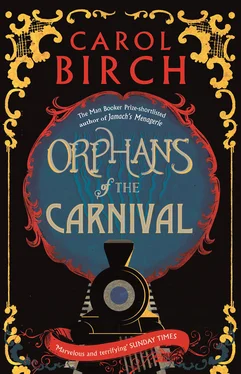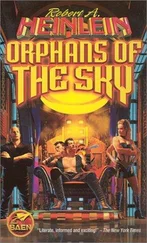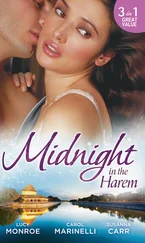‘Keep still.’
‘Mexico,’ she said. ‘Signs and wonders. We pull a paper from a doll, it says Mexico.’
‘OK,’ he said, ‘borrow some money from your rich family, and I’ll sell the amp and the bike and go on the building for a few months. We’ll go.’
‘I haven’t got a rich family.’
‘Well, compared to mine.’ He smudged the shadows on the page of his sketch book. ‘It’s not a ghost story though,’ he said.
‘Oh, I don’t know.’ Rose opened her eyes. ‘I think it sort of is.’

Not since the Baltimore ball had she taken part in a real social occasion where she didn’t have to wear her veil. In the old days, at home in the Sanchez house, she’d not gone veiled — or only now and then, if there were particular visitors. And here she was, with these important clever people, sitting up just as she was with the best of them. A fire burned high in the grand fireplace. Lovely rooms, lovely mirrors, silver, chandeliers, all these delicacies she was scared to touch because everyone looked at her covertly while she ate, as if she was a mythical beast who’d appeared at the table.
The crystal sparkled. And impossibly, there sat her husband, Theo, smiling with his cigar and his dark pomaded hair. My husband, mine.
Friederike smiled at her. Her eyebrows were two perfect black curves. ‘Julia,’ she said, ‘have you tried one of these little bonbons?’
‘They look delicious,’ Julia said, ‘thank you so much, but I really can’t eat another thing.’
Friederike took one herself, raising her eyebrows as she popped it in her mouth. Every move she made was graceful. Next to her an Italian acrobat, thick-lipped and handsome, sucked sugar from his fingers. Hermann Otto, humorous, his large, heavily bracketed lips smiling automatically every few seconds, was locked in animated debate with an old professor. The conversation was a mish-mash of French and English, harder for Theo, who was missing the ease of those drunken nights in Prague. From what he gathered, the professor, an Englishman long resident in Vienna, thought they were spending too much on this new statue for the great composer. ‘A lot of poor people in this city,’ the professor said. ‘Where’s the sense in grand statues when they’re dropping of cholera in the slums?’
‘What are you talking about?’ Massimo, the acrobat, was following the conversation with some difficulty.’
‘Spend money on the living,’ said Theo, ‘not the dead.’
‘We should respect a great man,’ said Massimo indignantly, ‘dead or no.’
‘Of course we should,’ the professor agreed, lifting his glass tipsily. He was a red-faced, portly man with a well-fed air. ‘I’m only saying—’
‘Have you been out to the country yet, Julia?’ Friederike asked.
‘Oh no, we haven’t had time.’
‘We must take a jaunt out one day.’ She dabbed the corners of her mouth with a white napkin, ‘When it’s a bit warmer. Oh, I’m so pleased you’ll be staying a little while in Vienna.’
‘Grand funerals,’ the professor said, ‘and fancy coffins, and fortunes spent on simpering whey-faced angels. If there was one thing the old emperor got right, that was it. Don’t see what was wrong with the old way. Tip ’em in and cover them over. Don’t matter to them, does it? Should have left it as it was.’
Theo had drunk a lot and lolled easily with one arm hooked around the back of his chair. ‘Absolutely,’ he said, ‘spend it on the living.’ His eyes were sleepy.
‘Man cannot live by bread alone,’ said Hermann.
‘Helps though,’ said Theo. He knew what they were all thinking. And he’s married her! Can you believe? Really? The unspoken question: do they actually, I mean does he, do you think they really, what can it be like?
‘I’m not talking about the living,’ the professor said. ‘Mozart’s dead. He couldn’t care less about a statue.’
‘You’re one of these smash ’em up people,’ Hermann said. ‘What about posterity?’
‘Oh, posterity looks after itself whatever we do.’
Something was bothering the Italian. ‘Are you saying,’ he began slowly, ‘that we should not honour the dead?’
‘Of course we should. But why do we have to put money into it? Granted that resources are limited, I say the money’s better spent on the poor.’
‘Always with us, as the Bible says,’ said Theo, and laughed.
He’d had too much. Julia watched him refilling his glass, trying to catch his eye.
‘No monuments. No churches, no cathedrals. No frescoes, no palaces, no towers, no…’ Hermann smiled benevolently at Julia from the far end of the table. ‘What a world of tedium. Don’t you think so, Julia?’
‘I think the rich should give to the poor,’ she said. ‘Jenny Lind gives ever such a lot to charity. That’s what you should do if you have lots.’
‘Hear hear.’
‘Well, of course,’ said Theo, ‘but that’s a different matter. It’s all right for you to say it would be dull, Hermann, but what if all the blood and money that went into raising those stupendous structures had been spent on the living?’
‘They were,’ said Hermann. ‘We’re the living. We enjoy them.’
‘Oh tosh!’ said Theo, and she was glad he hadn’t said anything stronger.
Massimo was with Hermann. ‘You should respect a great man,’ he said solemnly, ‘and you should bury the dead with respect.’
‘Depends on what you call respect.’
‘Once a fellow’s dead, he’s dead. So why fork out… once he’s gone, his body doesn’t matter a jot.’
‘It may not matter to its owner,’ Friederike said, ‘but it matters to others. It’s nice to have a grave for people to visit.’
‘Acknowledged,’ said Theo, ‘all I’m saying is a plain wooden cross in the ground would do as well as a monument.’
‘Tell me,’ Friederike asked him, ‘is your mother alive?’
‘Indeed she is not.’
‘And where is she laid to rest?’
Theo accepted a cigar from the professor. ‘In a cemetery,’ he replied, smiling, ‘what did you imagine?’
‘Do you visit her?’
‘Never.’ He accepted a light. ‘It wouldn’t occur to me. My mother’s been dead for many years, and I never got to know her.’
‘Your poor mother.’
‘Why poor?’ He blew out a cloud of smoke.
‘You should take her some flowers,’ Friederike said, leaning across and tapping his arm. ‘She’s your mother.’
‘I’m with you, Lent.’ The professor was still chewing. ‘Now, here’s a thing.’ He leaned forward and twisted all his thick red fingers together as if he was torturing them. ‘Here’s the state of things in my country. Medical science needs cadavers. Can’t progress without them. But they can’t get them. People don’t want their bodies messed with.’ He pulled his fingers apart and reached for a macaroon. ‘So you have a ridiculous situation, people slinking about in graveyards at night, everyone forced to break the law so the doctors can get on with their work. Look at old Jeremy Bentham! What a man! Left his body to science.’ He popped the macaroon in his mouth and sucked. ‘Soon as he died,’ he said indistinctly, ‘had himself dissected for the students. Put it in his will. Got himself preserved, and there he sits this moment with his head between his feet. Now there’s a sense of humour.’
‘Can we change the subject please?’ Friederike pulled a face.
‘You’re a dualist, Herr Lent?’ asked the professor.
‘I’m a realist. Now my wife,’ he said, smiling at her, ‘still has her old doll from when she was very small, and she loves it as if it was a child. Do you see? The doll is a piece of wood. Just the same with a body. Any meaning we attach to it, we put there ourselves.’
Читать дальше













